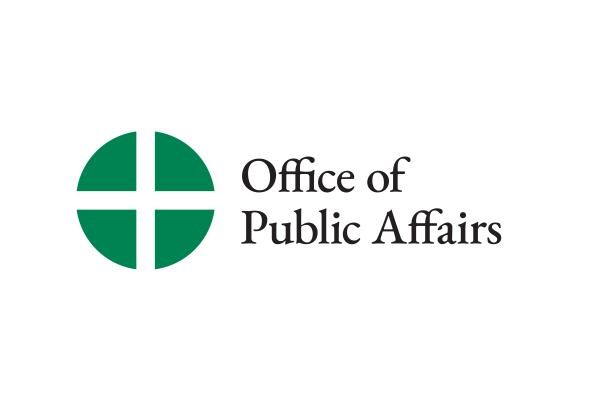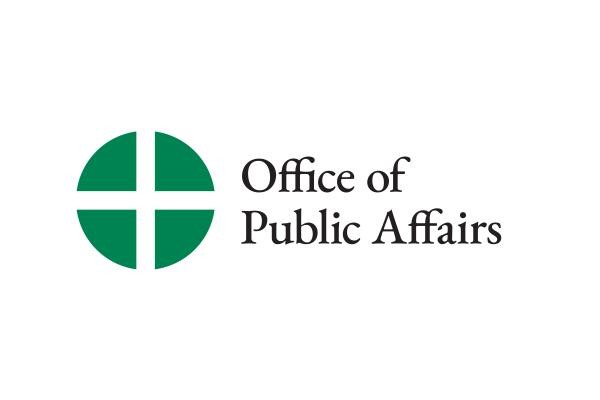Delegation of Prominent Jewish, Christian and Muslim Leaders Delivers Urgent Appeal to Secretary of State Powell for Immediate U.S. Reengagement on the Road Map to Peace
In an unprecedented united interreligious intiative, leaders pledge nationwide efforts with their constituents in support ofrenewed vigorous engagement by the Bush Administration in pursuing full implementation of the Road Map to Peace in the Middle East.
In an unprecedented united interreligious intiative, leaders pledge nationwide efforts with their constituents in support ofrenewed vigorous engagement by the Bush Administration in pursuing full implementation of the Road Map to Peace in the Middle East.
WASHINGTON (June 2, 2004) -- A delegation of prominent national Jewish, Christian and Muslim religious leaders, members of an unprecedented united, interreligious effort for peace among Israel, the Palestinians and the Arab states, met with Secretary of State Powell Tuesday to present an urgent appeal for immediate U.S. action to pursue the Road Map to Peace.
Recalling President Bush's recent declaration that, "the United States remains committed to the two-state solution for peace in the Middle East. . .and to the Road Map as the best path to realize this vision," the religious leaders expressed their urgent concern that "the Road Map has effectively been put on hold until after the elections." In their Appeal to Secretary Powell, the leaders expressed a united view that high level U.S. leadership on behalf of the Road Map must restart now and would have the support of majorities in all of their communities.
The leaders said, "Recent events in Gaza demonstrate the terrible human costs and grave dangers for the Palestinian people and for Israel if the cycle of violence continues" and they believe "that unless the United States makes the Road Map and Israeli-Palestinian negotiations an urgent priority now, the cycles of violence will jeopardize prospects for a two-state solution, further alienate our European and Mideast Arab allies, exacerbate conflict in Iraq, and increase the terrorist threat to the United States.
"The delegation, members of the National Interrelgious Leadership Initiative for Peace in the Middle East, are united in their support of a viable, independent and democratic Palestinian state alongside the internationally recognized Jewish state of Israel, with enduring peace and security for both peoples. While the main message of the religious leaders' Urgent Appeal to Secretary Powell is the call for active U.S. reengagement on behalf of the Road Map, the Appeal included four specific ideas for action:
Return a Presidential Envoy to Jerusalem with a commitment to remain there on the ground to renew momentum on the Road Map, including an immediate ceasefire and resumption of negotiations;
- Negotiate a timetable for specific reciprocal, simultaneous steps to be taken by the Palestinian Authority and the Israeli government, with a highly visible monitoring system to assure implementation by both sides;
Take the lead, in light of possible Israeli withdrawal from Gaza, to increase economic aid (with effective controls by a credible institution such as the World Bank) to support the Palestinian Authority's capacity to provide security, prevent violent attacks on Israelis, and deliver humanitarian aid, vital services, and development assistance to the Palestinian people;
Support realistic benchmark principles and ideas for possible Israeli-Palestinian, Israeli-Lebanese and Israeli-Syrian peace agreements, drawn from earlier official negotiations and from current Israeli-Palestinian civil society initiatives such as the People's Voice and Geneva Accord.
The religious leaders believe "active U.S. reengagement to restart negotiations and provide concrete humanitarian and development assistance can help break the downward spiral of violence and despair, and renew people's shattered hopes for peace in the Middle East." Moreover, they believe that "reengaged U.S. leadership for peace would be a timely, urgently needed message about our country's positive role in the world."
The religious leaders from Jewish, Christian and Muslim organizations are committed to helping mobilize public opinion to reinforce the urgency of U.S. re-engagement on behalf of the Road Map. In their meeting Tuesday the leaders reiterated their call for Twelve Urgent Steps for Peace, which they believe have majority support among Americans and closely parallel steps called for in the May 4 statement by the Quartet (U.S., European Union, Russia and the U.N.).
Launched in December 2003, the National Interreligious Leadership Initiative unites some of the most prominent American religious leaders for determined, direct U.S. leadership in pursuit of Arab-Israeli-Palestinian peace.
Members of the National Interreligious Initiative for Peace are:
- Christian leaders include two Roman Catholic Cardinals, President of the United States Conference of Catholic Bishops, Primate of the Greek Orthodox Church in America, leaders of the Lutheran, Presbyterian, Episcopal, United Methodist, United Church of Christ and Disciples of Christ Protestant denominations, five prominent Christian evangelical leaders, and editors of two of the most influential national Christian publications.
- Jewish leaders include the heads of the Central Conference of American Rabbis, the Religious Action Center of Reform Judaism, the United Synagogue of Conservative Judaism, the Reconstructionist Rabbinical Association and the University of Judaism.
- Muslim leaders include heads of the largest national Muslim religious organizations -- Islamic Society of North America and Islamic Circle of North America -- as well as President of the Council of Mosques; and leaders of United Muslims of America, The Mosque Cares, and the American and International Sufi Muslim Associations.
In addition to meeting with Secretary of State Powell, the National Interreligious Leadership Initiative has sent letters outlining their position to President Bush, National Security Advisor Condoleezza Rice and to every member of Congress, citing the urgency of renewed U.S. leadership for the Road Map. Convinced that peace in the Middle East should be a bi-partisan priority, the leaders also intend to seek support for their Urgent Appeal from Democratic presidential candidate Senator John Kerry.
The leaders reaffirm their commitments to help mobilize their constituencies for peace, including the following actions by some or all of the organizations represented:
Utilizing the extensive communications resources within their religious communities including church, synagogue and mosque bulletins, newsletters, e-mail lists and websites to build an active, broad public voice for peace during this critical time. Through articles, sermons, and ongoing communications, the leaders will spread the message among their congregations and constituents in support of a united interfaith focus for urging the U.S. to renew its involvement in negotiations
Organizing interfaith leadership committees in major U.S. cities across the country, modeled on the National Interreligious Leadership Initiative to build regional efforts that could work with members of Congress, develop outreach to the media, support Israeli and Palestinian organizations working together for peace, and initiate collaborative education programs to create a broad based, bi-partisan public constituency for revitalizing U.S. efforts for peace.
The delegation members believe that both the deepest values of their traditions and the urgency of the current situation necessitate strong, united interfaith action now to mobilize their communities to support the U.S. leadership essential to achieving peace. The religious leaders believe that "the land which was the birthplace of all three Abrahamic religions can once again become a source of hope, justice and reconciliation for the whole world. Jerusalem can become the city of peace, and U.S. leadership is urgently needed to help make it happen."


